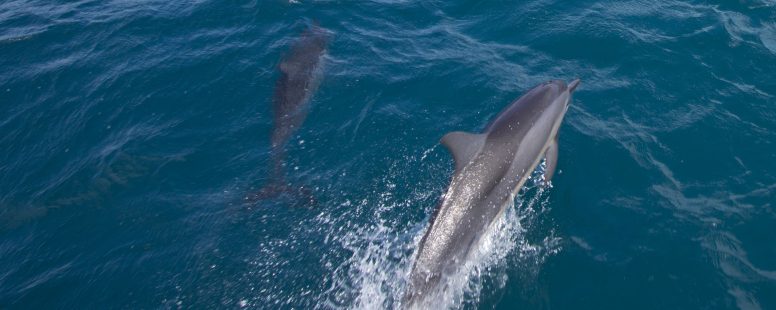Na Pali part I – Hawaiian cliffs, doplhins and barking sands
In the area of the green Hawaiian island of Kaua’i you can find a hidden treasure – Nā Pali Coast State Park. The name Nā Pali in Hawaiian means in cliffs, so you can figure out what is the main its attraction. The 17-mile cliff coast stretches from Ke’e Beach to Polihale Beach. Nā Pali cliffs are reportedly among the highest in the world and reach more than 1000 meters above the turquoise waters of the Pacific. They have been shaped over the centuries through erosion activities, like many caves along the coast. Nā Pali cliffs can be seen in three ways: from the air, land and water, and each of them guarantees completely new experiences and emotions. Nā Pali from the land Cliffs can be seen by taking a tour along the Kalalau Trail. This path starts at the end of the scenic route 56, called Kuhio Highway. The Kalalau Trail starts at the beautiful Ke’e Beach and ends at the spectacular Kalalau Valley. Camping in Nā Pali Coast State Park is allowed, but only after obtaining special permission. On the Kalalau Trail there’re two places to put up the tent – Kalalau and Hanakoa. During 11 miles of hiking trail, you’ll see beautiful valleys, verdant vegetation and amazing views of the coast. You can also take a shorter trip to Hanakapiai Beach and Hanakapi’ai Falls. The length of the route from the Ke’e Beach to Hanakapi’ai Beach reaches 4 miles. Unfortunately, swimming there is prohibited, and further tour along Kalalau Trail requires permission. When in 1960 National Geographic published an article titled “Kalalau Valley – the garden of Eden” cliffs began to be frequented by hippies wanting to settle in this beautiful place. In order to protect the unique nature of the park, it was necessary to limit the influx of visitors through the introduction the permission to entry. Currently camping is allowed up to 5 days and costs 20$ per person. However, the route can be continued without permission, turning left in the direction of Hanakapi’ai Waterfalls. Total length of the route is 2 miles one way, and the path is quite flat and leads through the dense bamboo forest. source: https://www.hawaii-guide.com/kauai/hiking_trails/kauai-hiking-maps There is one more possibility to admire Nā Pali cliffs from the land. It can be seen from the two viewpoints: Kalalau and Pu’u o Kila overlook, while exploring Waimea – the Grand Canyon of the Pacific, located on the other side of the cliffs in Kokee State Park. You’ll find the post here. Nā Pali from water An unforgettable experience guarantees a boat cruise. In the course of the cruise you can see the huge peaks of the coast, paradise beaches and coastal caves. Most tours stop at the Treasures Beach, where you can snorkel with turtles and colorful tropical fish. However, the greatest attraction are dolphins, playing in Pacific waters. The most popular for this area are spinner dolphins, well-known for their eagerness to play. Well, apparently, the best fun for them is to escape from the boats, heading Nā Pali coast. Dolphins like to draw attention to the fireworks jumping over the water mirror where they operate in the air, hence their name spinner. With some luck, besides dolphins and turtles, whales also can be seen. Boats pass by the so-called Barking Sands. This name came from the characteristic sound of the pacific waves striking the shore. The sound of the waves resembles a dog barking. It’s caused by a unique sand composition which due to the impact of waves makes a distinctive canine sound. The beach reaches 25 miles, and the water there has a brighter color. This is the most favorite doplhins’ playgound. On the other hand, the land close to Nā Pali coast is occupied by the United States Navy. Military base located here, is an important part of the Pacific Missile Range Facility. This is one of the world’s largest training grounds. In addition to numerous ships and fighters, there‘s also spaceport. It’s best to take a cruise in the morning when the Pacific is calm. Boats sail from Allen Port, where you can find many trip operators like: Kaua’i Sea Tours, Na Pali Explorer, Captain Andy’s, Liko Kaua`i Cruises. Another interesting option are canoe trips diuring which you can visit the interior of the coastal caves and see the cliffs and inaccessible beaches like Hanakapi’ai or Honopu from a very close perspective, not to mention turtles and dolphins. Trips start in Ha ‘ena and end in Polihale. How about just going to the beach… The best way to finish visiting the coast is a trip to Polihale Beach, famous for the most beautiful sunsets in Hawaii. During sunset, Nā Pali cliffs take different shades from red to orange. This is the longest beach on the island, and who knows maybe even the widest. Polihale in Hawaiian language means “home from the underworld” and according to old Hawaiian beliefs it’s the place where souls go to “Po” – the underworld. The biggest advantage of Polihale Beach is that it’s off the beaten track and there’re usually very few people here. You can get to the beach by going to the end of Highway 50, where, after passing previously mentioned the Pacific Missile Range Facility, you must turn left on a gravel road.
